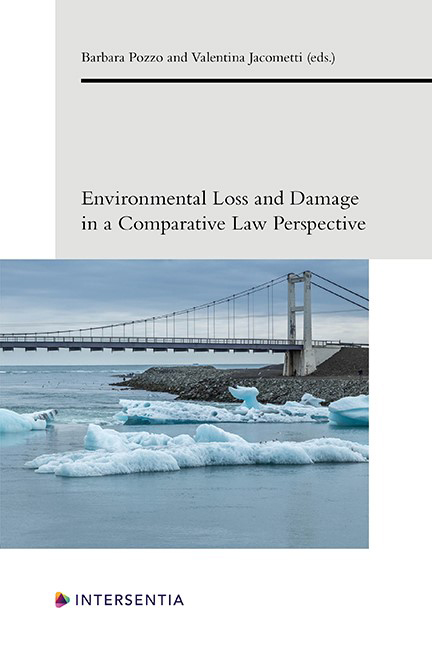Book contents
- Frontmatter
- Preface
- Contents
- List of Authors
- PART I LIABILITY FOR ENVIRONMENTAL HARM IN THE EU
- PART II PRIVATE AND CORPORATE ENVIRONMENTAL LIABILITY
- PART III THE ROLE OF CRIMINAL LIABILITY
- PART IV LEGAL TRANSPLANTS IN THE ENVIRONMENTAL FIELD: THE CASE OF ENVIRONMENTAL LIABILITY
- PART V STATE AND INTERNATIONAL ENVIRONMENTAL LIABILITY
- PART VI CLIMATE CHANGE LIABILITY
- PART VII LIABILITY, CLIMATE CHANGE AND NATURAL HAZARDS: THE ROLE OF INSURANCE
- PART VIII REAL COMPENSATION AND OFFSET REGIMES: THE STRATEGY OF “NO NET LOSS”
- About the Editors
Financing Sustainable Growth in Europe: The Key Role of Sustainable Finance in Preventing Environmental Damage and Implementing Adaptation Strategies
Published online by Cambridge University Press: 26 May 2021
- Frontmatter
- Preface
- Contents
- List of Authors
- PART I LIABILITY FOR ENVIRONMENTAL HARM IN THE EU
- PART II PRIVATE AND CORPORATE ENVIRONMENTAL LIABILITY
- PART III THE ROLE OF CRIMINAL LIABILITY
- PART IV LEGAL TRANSPLANTS IN THE ENVIRONMENTAL FIELD: THE CASE OF ENVIRONMENTAL LIABILITY
- PART V STATE AND INTERNATIONAL ENVIRONMENTAL LIABILITY
- PART VI CLIMATE CHANGE LIABILITY
- PART VII LIABILITY, CLIMATE CHANGE AND NATURAL HAZARDS: THE ROLE OF INSURANCE
- PART VIII REAL COMPENSATION AND OFFSET REGIMES: THE STRATEGY OF “NO NET LOSS”
- About the Editors
Summary
INTRODUCTION
This analysis will develop along three main lines: after some preliminary comments on sustainable finance (its origins and recent development), the analysis will turn to the current situation on the financial markets in the light of the choices made by European lawmakers after the 2007–2008 crisis. Finally, the main critical issues related to green finance will be pointed out and briefly illustrated, with a particular focus on the disclosure of climate risks.
Within industrial and post-industrial societies, the uncontrolled appropriation of natural resources has led to the realisation of the so-called “tragedy of the commons”, the actual scenario which current and future generations will have to deal with for years to come. Climate change and the attendant climate change mitigation and adaptation strategies are one of the major challenges ahead, in particular since their complexity and possible scale and consequences are still difficult to foresee. Climate change and related issues are now globally recognised as a major priority on the sustainability agenda due to the potentially enormous disruptive impact they may have on global economies as a whole. A lack of preparedness on this front is no longer acceptable or sustainable. The rapidly changing scenario has made it clear that radical changes need to be implemented now without further delay.
Following the adoption of the Paris Agreement on Climate Change on 1 January 2016 and the related UN 2030 Agenda for Sustainable Development, on March 2018 the EU Commission launched the “Action Plan: Financing sustainable growth”. The aim of this Plan is to refocus capital flows on sustainable development, assessing and managing climate-related financial risks and fostering transparency and long-termism within financial and economic activities.
Strategies in a field such as this are extremely complex due to the incredibly broad scope of the changes required: cross-sectoral planning, coordination and consistency need to be pursued as priority methodological targets, while at the same time implementing the change will require a huge mobilisation of financial resources which are currently unavailable within a market that is busy financing non-sustainable activities.
Major interests are affected by the new trend, which means that it is only by involving the major economic actors in the transition towards low-carbon economies that there can be any chance of the expected changes taking place.
- Type
- Chapter
- Information
- Environmental Loss and Damage in a Comparative Law Perspective , pp. 147 - 166Publisher: IntersentiaPrint publication year: 2021



